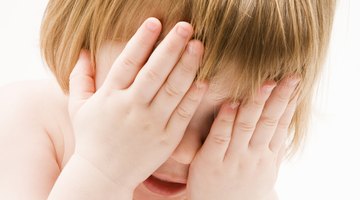What Are the Causes of High Pitched Screams in Children?
Few things cause as much of a visceral reaction in parents as the sound of a child’s screams.
Your instincts cause you to jump up in panic when your child screams out in the night. You probably feel emotionally drained after spending a day with a screaming toddler. While a child of any age might communicate with a deafening, high-pitched scream when stressed, AskDr.Sears.com assures that most screaming habits peak when a child is 18 months to 2 years old. Although stressful for you to handle, your child's screams serve a purpose.
Sickness
Even if your child cannot identify his feelings, he might cry out in a high-pitched scream if he is uncomfortable. Some children cry or scream when coming down with an illness, according to Children’s Hospital Colorado.
If a child's ears are throbbing from an infection, his screams and pulls on his ears alert the parent something is wrong. An intense, high-pitched scream might be a sign of a major medical emergency, so consult a doctor if your child is running a fever or if your gut instinct tells you something is wrong.
Disorders

Sudden Unexplained Crying in Toddlers
Learn More
A child with autism or other emotional or mental disorders might scream for a number of reasons, including fear, boredom or irritability. A disabled child might feel frustrated if he cannot communicate properly or if someone else misunderstands what he is saying, Autism Speaks reports. An autistic or mentally disabled child might not understand subtle social cues and scream instead of replying in a normal tone.
Night Terrors
Even though it might be alarming to hear your child’s high pitched screams in the night, there is a good chance your child will have no memory of the event the next day. Night terrors are normal for young children, even if their behaviors during the terrors seem anything but normal.
Your child might thrash wildly, kick and scream, even after you try to console him, according to KidsHealth.
Make your child's bed a safe space by removing anything nearby that might hurt him when he thrashes about. To help prevent night terrors, KidsHealth.org suggests reducing the child's stress, establishing a relaxing bedtime routine and ensuring the child is well rested.
Emotional or Behavioral

Why Infants Arch During Feeding
Learn More
No matter how annoying the screams, your child has likely realized that screaming is a very effective way to get attention. Your child might scream in his crib until you pick him up. A toddler might lack the vocabulary or impulse control to correctly manage emotions, so he screams when he feels out of control, HealthyChildren.org states. Your child’s shrill screams might come from a very real fear of a person or anxiety about a situation, so high-pitched screams should not be ignored.










